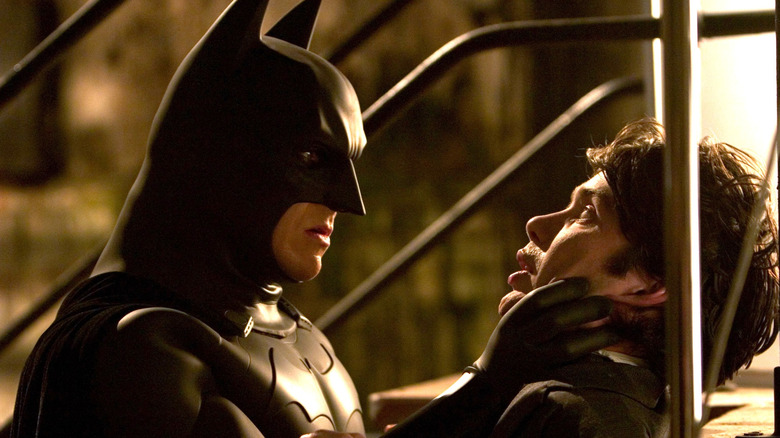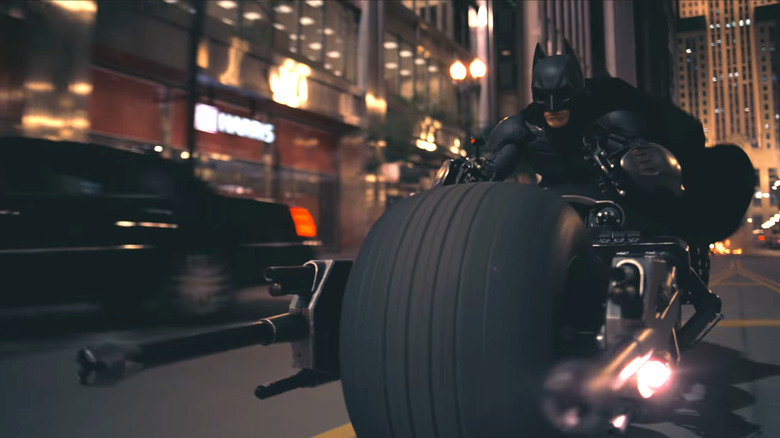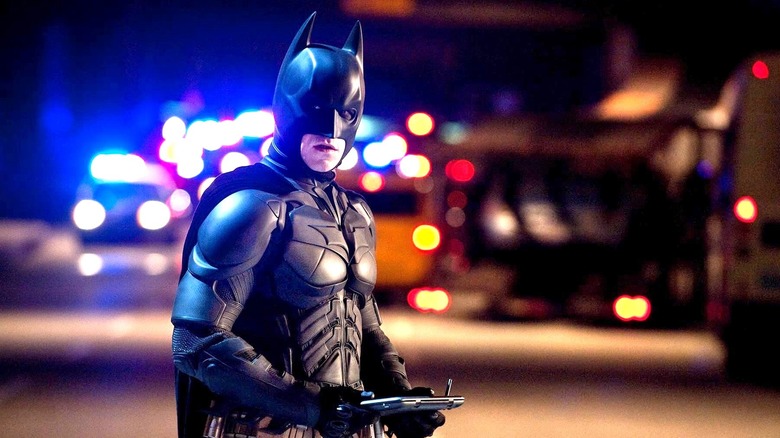Why Christopher Nolan's Batman Begins Was Designed As A Solo Movie, Not A Trilogy Starter
Although Christopher Nolan's Batman films are largely referred to as the Dark Knight trilogy, Nolan himself took each movie one at a time. When he was asked in a 2015 interview with The Hollywood Reporter if he'd known he was "signing up for multiple films" when he agreed to make 2005's "Batman Begins," Nolan replied, "No, not at all. I only had a deal to do the one film." He continued:
"Privately, ourselves, we started to put together a vague idea of where a second and third film were going, and then I immediately shot them down. I was like, 'You know what? You've got to put everything into the one movie and just try and make a great movie because you may not get this chance again.' [...] And then, when it succeeded, we were able to think about, 'OK, what would we do in a sequel?'"
"Batman Begins" is almost completely self-contained, save for one brief scene at the end where it teases the Joker's appearance in a follow-up. The movie's final act is probably the biggest indicator of this: Not only is half of Gotham plunged into a poisonous mist that causes intense hallucinations, but Bruce Wayne himself (Christian Bale) even crashes a metro train into a building, causing an untold amount of property damage.
This is a stark contrast to, say, the Tom Holland-led "Spider-Man" trilogy, which deliberately keeps the stakes low with 2017's "Spider-Man: Homecoming" and then escalates them throughout the sequels. "Homecoming" also saves a romance between Holland's web-slinger and his love interest, MJ (Zendaya), for the next film, whereas "Batman Begins" fully explores Bruce's relationship with his childhood sweetheart, Rachel Dawes (Katie Holmes). In other words, "Homecoming" plays the long game, but "Batman Begins" is only interested in being a standalone epic.
The Dark Knight trilogy avoided a common trilogy error of the 2000s
Nolan admitted to THR that he'd felt some pressure to make "Batman Begins" the deliberate start of a trilogy since that's what seemingly everyone was doing at the time. "Everybody thought in terms of trilogies, which I guess they probably don't anymore because they split the third film into two," he remarked. "But at the time, the 'Matrix' [directors] were doing their sequels, everything was about trilogies, 'What's the trilogy?!' And we didn't want to answer that question."
The "split the third movie into two" trend of the 2000s was most infamously done with "The Matrix Reloaded" and "The Matrix Revolutions," which were filmed back-to-back after the first "Matrix" (a standalone film released in 1999) became a runaway success. Then, around the time "Batman Begins" began production, Disney did the same thing with its first two "Pirates of the Caribbean" sequels. Both the initial "Matrix" and "Pirates" trilogies got the same response: Audiences unanimously loved the first entry, criticized the second installment for feeling too much like set-up, and took the third chapter to task for being too messy and convoluted.
The Dark Knight trilogy avoided this issue. 2008's "The Dark Knight" isn't the first half of a giant movie, but undeniably its own jam-packed adventure that wraps everything up in a nice little bow. Some fans have always regarded the film's closing moments — in which Batman flees the police after taking the fall for Gotham district attorney Harvey Dent's (Aaron Eckhart) crimes following his transformation into Two-Face — as a cliffhanger, but it also works fine as a downer ending to a standalone story. There's a running theme of chaos vs. order throughout the film, so it's fitting that Batman saves the day by destroying his own reputation.
Each of Nolan's Batman movies feels completely different
Another major appeal of the Dark Knight trilogy is that Nolan never felt rushed to make each film. After "Batman Begins," he took a break to direct "The Prestige," a historical sci-fi thriller about over-competitive magicians. Then, after "The Dark Knight," he went and made "Inception," an original sci-fi movie centered on the idea of entering people's dreams. There was a three and then a four-year gap between Nolan's Batman films, which made each of them (especially 2012's "The Dark Knight Rises") feel like a proper event.
Those breaks also led to each of the three movies feeling different in tone, thematic material, and even color grading. There's a clear evolution in the directing style as well, as Nolan gradually moved away from quick close-ups and embraced longer, wider takes instead. You really get the sense watching these films that you're seeing a director grow in confidence and maturity, which is a feeling that wouldn't have been as noticeable if the three movies had been produced in quick succession.
For Nolan, giving himself time to breathe between Batman films is a huge part of what helped them work out so well. As he told THR:
"If you're really trying to grow and nurture a franchise ... you need time. And that doesn't mean necessarily even working full-time on it itself; it means time to throw some ideas together and then let them sit, go off and do something else, come back and see what still feels right and everything. Ironically, I think it was very valuable to making a coherent trilogy, because you were really able to get a sense of what each film had become to the audience before you then moved the story forward."


